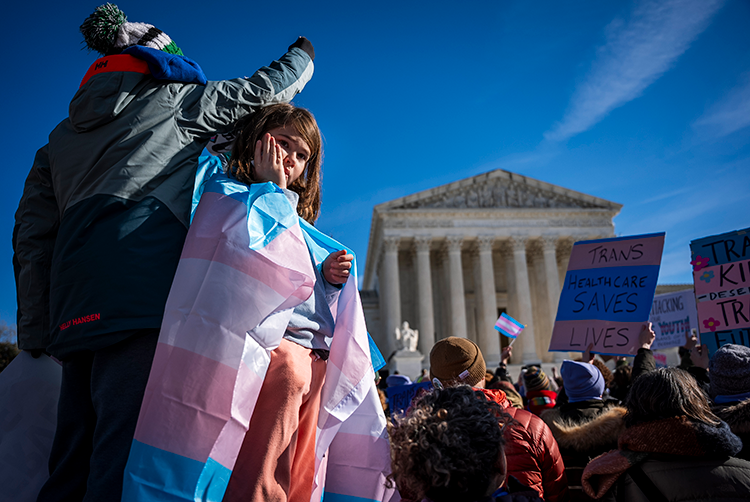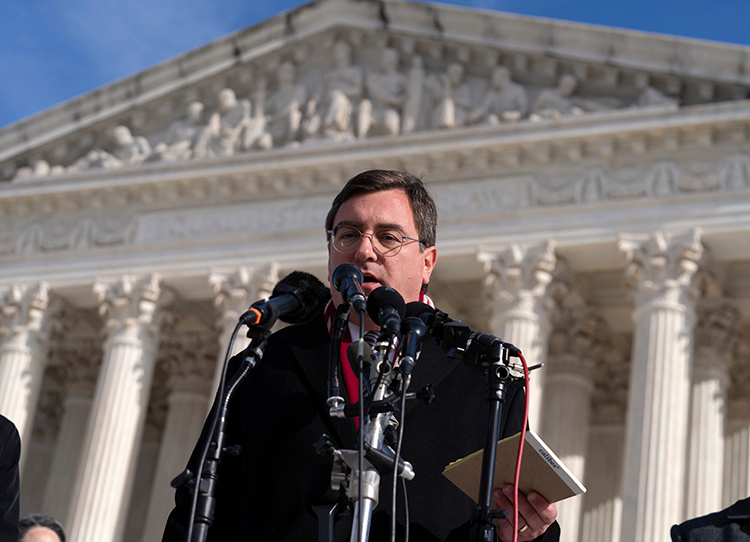Lawyers spar in Supreme Court over constitutional rights in transgender health care case

Protesters and supporters of gender-affirming health care for transgender children demonstrated outside the U.S. Supreme Court building on Wednesday. (Angelina Katsanis/POLITICO via AP Images)
The lengthy arguments this week in United States v. Skrmetti, a major case about whether a state law barring certain medical treatments for transgender minors violates the 14th Amendment’s Equal Protection Clause, were marked by past positions, anticipation of future battles, a historical first and one justice’s curious silence.
The justices on Wednesday spent nearly two-and-a-half hours debating an issue—transgender rights—that has been a cultural hot point from local school restrooms to the race for the White House. They looked ahead to the next gender identity battles beyond medicine and involving other legal theories or contexts. Eight members of the court had a lot to say, while the ninth said nothing. And they heard from the first known or openly transgender advocate to argue before the U.S. Supreme Court.
That lawyer, Chase Strangio of the American Civil Liberties Union, argued on behalf of three transgender teens, their families and a Memphis doctor. They are challenging a 2023 Tennessee law that bars access to puberty blockers and hormone treatments for transgender minors.
“Here, what [Tennessee has] done is impose a blunderbuss ban overriding the very careful judgment of parents who love and care for their children and the doctors who have recommended the treatment,” Strangio told the court.
 On Wednesday, Chase Strangio became the first known transgender attorney to argue before the U.S. Supreme Court. He was honored with a Stonewall Award by the ABA Commission on Sexual Orientation and Gender Identity in 2020. (AP Photo/Jose Luis Magana)
On Wednesday, Chase Strangio became the first known transgender attorney to argue before the U.S. Supreme Court. He was honored with a Stonewall Award by the ABA Commission on Sexual Orientation and Gender Identity in 2020. (AP Photo/Jose Luis Magana)Also arguing against the law was U.S. Solicitor General Elizabeth B. Prelogar, with President Joseph R. Biden’s administration having intervened in the challenge.
The Cincinnati-based 6th U.S. Circuit Court of Appeals reversed a preliminary injunction and sustained the law based on Tennessee having a rational basis to conclude that puberty blockers and hormone treatments presented dangers to some transgender youths.
While the private plaintiffs’ claims were based on the Equal Protection Clause and a substantive due process right of parents over the medical treatment of their children, the Supreme Court granted review of the solicitor general’s petition raising only the equal protection issue.
That challenge is based on the fact that the Tennessee law, known as SB 1, only restricts transgender minors from treatments, while continuing to allow them for young people to treat congenital defects, precocious puberty, or other conditions. The law also declares that the state has an “interest in encouraging minors to appreciate their sex” and in prohibiting treatments “that might encourage minors to become disdainful of their sex.”
The ABA submitted an amicus brief in the case, opposing the Tennessee law on equal protection grounds. “Equal protection forbids differential treatment in the exercise of important constitutional rights absent the strongest justification, and Tennessee’s SB1 cannot withstand scrutiny under that standard,” stated the ABA amicus brief.
“This case is about access to medications that have been safely prescribed for decades to treat many conditions, including gender dysphoria,” Prelogar said. “But SB 1 singles out and bans one particular use. In Tennessee, these medications can’t be prescribed to allow a minor to identify with or live as a gender inconsistent with the minor’s sex.”
Tennessee focused heavily on its arguments that there is medical uncertainty surrounding certain treatments for young people with gender dysphoria, in particular as evidenced by shifting attitudes in European nations.
“Half of the states, Sweden, Finland, and the [United Kingdom] all now restrict the use of these interventions in minors and recognize the uncertainty surrounding their use,” said J. Matthew Rice, the solicitor general of Tennessee. “These interventions carry often irreversible and life-altering consequences.”“
Conservative justices mostly appear skeptical of challenge
It quickly became clear that the challengers of the Tennessee law would face an uphill battle to convince a majority of the justices to accept their arguments.
“I understand there’s a dispute between both sides on how extensive any evolution or increase in uncertainty in Europe has been and elsewhere,” Chief Justice John G. Roberts Jr. told Prelogar. “And, of course, we are not the best situated to address issues like that.”
Nine years ago, in Obergefell v. Hodges, Roberts wrote the principal dissent to the court’s decision that the 14th Amendment guarantees a right of same-sex marriage.
“Five lawyers have closed the debate and enacted their own vision of marriage as a matter of constitutional law,” Roberts said in the 2015 dissent, referring to his five colleagues in the majority.
Four years ago, Roberts surprised some observers by joining the court’s opinion in Bostock v. Clayton County, Ga., holding that Title VII of the Civil Rights Act of 1964 protected employees on the basis of sexual orientation and gender identity.
One common explanation was that Obergefell was a constitutional case and Bostock one of statutory interpretation. Any mistaken view adopted by the court in the Title VII case could be corrected by Congress, the that theory went.
 The case is named for Tennessee Attorney General Jonathan Skrmetti, who spoke to reporters outside the Supreme Court building. (AP Photo/Jose Luis Magana)
The case is named for Tennessee Attorney General Jonathan Skrmetti, who spoke to reporters outside the Supreme Court building. (AP Photo/Jose Luis Magana)It seemed that in the Tennessee case, it was the chief justice of the Obergefell dissent signaling his reluctance to extend constitutional protections to transgender people.
“We might think that … we can do just as good a job with respect to the evidence here as, you know, Tennessee or anybody else, but my understanding is that the Constitution leaves that question to the people’s representatives rather than to nine people, none of whom is a doctor,” Roberts said.
The chief justice’s views were particularly important for the potential outcome of the case. Several of the court’s other conservatives—Justices Clarence Thomas, Samuel A. Alito Jr., and Brett M. Kavanaugh—sounded equally skeptical of ruling for the challengers.
Kavanaugh called treatment for transgender minors “an obviously evolving debate.”
“If it’s evolving like that and changing and England’s pulling back and Sweden’s pulling back, it strikes me as, you know, a pretty heavy yellow light, if not red light, for this court to come in, the nine of us, and to constitutionalize the whole area,” he said.
Thomas and Alito had dissented in both Obergefell and Bostock. Kavanaugh was not on the court for Obergefell, but he was a dissenter in Bostock. He expressed concerns in the Tennessee argument that that any ruling that the state law was a sex-based classification subject to heightened constitutional scrutiny would call into doubt state laws that bar transgender girls and women from female athletics.
“Would transgender athletes have a constitutional right, as you see it, to play in women’s and girls’ sports … notwithstanding the competitive fairness and safety issues that have been vocally raised by some female athletes?” Kavanaugh asked.
Prelogar said the court could leave the transgender sports issue for another day.
The court currently has three petitions for review pending from states—Arizona, Idaho, and West Virginia—whose laws limiting transgender females’ sports participation have been blocked. (Two of those, the Arizona and Idaho cases, are based on the Equal Protection Clause, while West Virginia’s case involves Title IX.)
Justice Amy Coney Barrett, another conservative member of the court, wasn’t part of Obergefell or Bostock. Oh Wednesday, she returned several times to the idea that the private challengers of the law could pursue their parental-rights claims even if the court rules against them on equal protection.
Justice Neil M. Gorsuch was uncharacteristically silent during the entire argument. He wrote the Bostock opinion, which held that an employer treating a worker differently based on sexual orientation or gender identity was acting on the basis of sex in violation of Title VII.
“With respect to how to identify a facial sex classification in the first place, I don’t think there’s any relevant difference between the court’s approach in Bostock and what this court has long done under the Equal Protection Clause,” Prelogar said.
One liberal justice ‘suddenly quite worried’
The court’s more liberal members—Justices Sonia Sotomayor, Elena Kagan, and Ketanji Brown Jackson—appeared more accepting of the challengers arguments.
Kagan said that while she agreed the Tennessee law was a sex-based classification in a formal sense, “what’s really going on here is discrimination against, a disregard for, young people who are trans.”
Jackson said she was “suddenly quite worried” that some of her conservative colleagues’ views were “undermining the foundations of some of our bedrock equal protection cases.”
The packed courtroom included Tennessee lawmakers who had pushed for SB 1, as well as some of the private plaintiffs, including transgender teenagers affected by the law.
At the very end of the argument, Prelogar referred to one of those plaintiffs, a 16-year-old transgender male identified in court papers as Ryan Roe, who relies on testosterone treatments he is now barred from receiving in Tennessee.
“Ryan’s gender dysphoria was so severe that he was throwing up before school every day,” Prelogar said. “Ryan has told the courts that getting these medications after a careful consultation process with his doctors and his parents has saved his life. His parents say he’s now thriving. But Tennessee has come in and categorically cut off access to Ryan’s care, and they say this is about protecting adolescent health, but this law harms Ryan’s health and the health of all other transgender adolescents for whom these medications are a necessity.”
A decision in the case is expected by late June.
See also:
Tennessee law denies transgender youths equal access to medical care, ABA says
6th Circuit panel believes law banning transgender care for minors is likely constitutional
Write a letter to the editor, share a story tip or update, or report an error.



